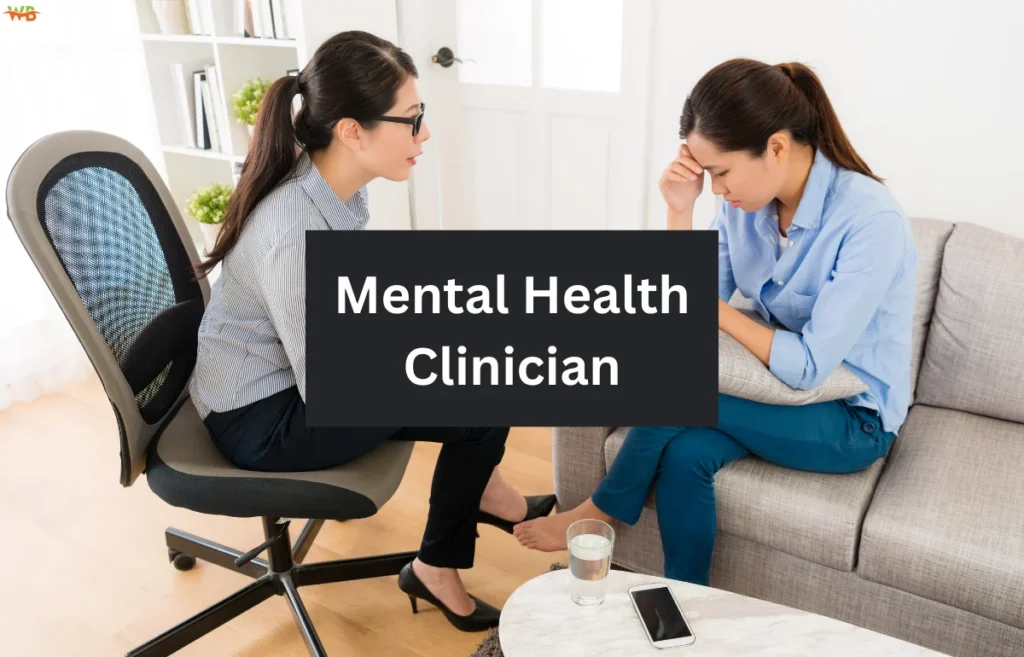
In today’s fast-paced and often stressful world, mental health is a topic that has gained considerable attention. A mental health clinician is a professional who specializes in diagnosing, treating, and helping individuals with mental health conditions. Their role is critical in supporting people through difficult times and ensuring they receive the help they need to live a fulfilling life. This article explores the essential role of mental health clinicians, the types of services they provide, and how they can make a significant difference in one’s well-being.
What Does a Mental Health Clinician Do?
Mental health clinicians are licensed professionals who specialize in various aspects of mental health, including therapy, counseling, and psychiatric care. They work with individuals, families, and communities to address mental health issues such as anxiety, depression, bipolar disorder, and more.
Types of Mental Health Clinicians
There are different types of mental health clinicians, each with their own expertise and treatment methods. Some of the increasingly typical positions in the field are presented below:
Psychiatrists: Physicians specializing in mental health, capable of diagnosing conditions, prescribing medications, and offering therapeutic interventions.
Psychologists: Experienced mental health practitioners skilled in psychological testing and therapeutic practices. They typically cannot prescribe medication but offer talk therapy and other therapeutic interventions.
Licensed Clinical Social Workers (LCSWs): Social workers with advanced training who provide counseling and psychotherapy. They work in several different kinds of contexts, including community and clinical settings.
Mental Health Counselors: Often provide talk therapy and counseling services, focusing on short-term or long-term therapy for individuals or groups.
Marriage and Family Therapists (MFTs) – Specialized in helping individuals, couples, and families address emotional and mental health issues.
The Importance of Mental Health Clinicians
A mental health clinician plays a pivotal role in improving the quality of life for those struggling with mental health challenges. They offer compassionate support and expert guidance, which helps individuals manage symptoms and build healthier coping strategies. By providing tools, techniques, and emotional support, these professionals create a safe space for their patients to confront and address their mental health concerns.
When Should You See a Mental Health Clinician?

Many people experience times of emotional distress or mental health difficulties. However, recognizing when to seek help from a mental health clinician can be a challenge for some. The indicators below signal that it might be time to get in touch:
Persistent sadness or depression that doesn’t improve over time.
Anxiety or worry that disrupts daily activities.
Difficulty handling stress in personal or professional life.
Relationship problems that seem to remain unresolved despite efforts.
Emotional distress stemming from trauma or personal loss.
If you are having thoughts of self-harm or suicide, seeking immediate assistance is crucial.
If any of these issues resonate with you or someone you know, it’s crucial to consider consulting a mental health clinician to get the necessary support.
Benefits of Consulting a Mental Health Clinician
Working with a mental health clinician offers numerous benefits that go beyond simply talking about your problems. Some of the key advantages include:
Professional Expertise
Mental health clinicians are trained to understand the complexities of mental health disorders and how to best treat them. Whether it’s through cognitive-behavioral therapy (CBT), dialectical behavior therapy (DBT), or medication management, they tailor their approach to each individual’s unique needs.
A Safe Space for Emotional Expression
A mental health clinician provides a confidential and non-judgmental space for individuals to express their feelings. This emotional release can lead to profound healing and self-understanding, helping people work through their emotional struggles in a healthy way.
Building Coping Strategies
Through therapy, clinicians teach valuable coping skills that can help individuals manage stress, anxiety, depression, and other mental health conditions. These strategies are essential for fostering resilience and maintaining well-being.
Long-Term Mental Wellness
With regular sessions and ongoing care, mental health clinicians work with their patients to build long-term strategies for mental wellness. These strategies can reduce the frequency of symptoms, improve emotional regulation, and help individuals lead a more fulfilling life.
How to Choose the Right Mental Health Clinician

Picking the right mental health professional can significantly impact your treatment experience. A good match can significantly enhance the therapy experience, while a poor fit may hinder progress. The recommendations that follow will assist you opt for the best expert:
1. Assess Their Qualifications and Experience
Make sure the clinician you choose has the necessary credentials and licenses to practice in your area. A licensed mental health professional will have completed advanced education, training, and supervised clinical hours. You can often find these credentials listed on their website, or ask them directly.
2. Consider Their Specialization
Different clinicians specialize in different aspects of mental health. For example, if you are struggling with anxiety, a psychologist with experience in cognitive-behavioral therapy may be a good fit. A psychiatrist is frequently the best person to consult when medication is required to treat a mood problem.
3. Evaluate Their Approach to Treatment
It’s important to feel comfortable with a clinician’s therapeutic style. Some may offer a structured approach, while others may focus on talk therapy. Don’t be afraid to ask about their methods and whether they align with your needs.
4. Look for Reviews and Testimonials
Check online reviews or ask for testimonials from previous clients. While confidentiality prevents clinicians from sharing personal information, many have reviews available that reflect the quality of care they provide.
5. Trust Your Instincts
Ultimately, you should feel comfortable with your mental health clinician. If you feel heard, understood, and supported in the sessions, then you’ve found the right match. If the connection with your clinician doesn’t seem to work, it’s fine to search for a better-suited professional.
The Bottom Line: Why Mental Health Clinicians Matter
Mental health clinicians play an indispensable role in helping individuals overcome mental health challenges and improve their overall well-being. From providing therapy to prescribing medication, these professionals are equipped with the skills and knowledge to offer personalized support. If you or someone you know is struggling, don’t hesitate to reach out to a mental health clinician for the help and guidance needed to thrive.
FAQs About Mental Health Clinicians
1- What qualifications do mental health clinicians need?
- Mental health clinicians typically need a master’s degree or doctorate in psychology, social work, counseling, or psychiatry, along with extensive clinical training and licensure. Specific qualifications vary based on the clinician’s role and specialty.
2- Can a mental health clinician prescribe medication?
- Psychiatrists and some psychiatric nurse practitioners are authorized to prescribe medication. Other mental health clinicians, such as psychologists and counselors, do not have prescribing rights but may work with medical professionals for medication management.
3- How often should I see a mental health clinician?
- The frequency of visits to a mental health clinician depends on individual needs. Some may benefit from weekly sessions, while others may meet less frequently once progress is made. Your clinician will recommend a plan tailored to your goals.
4- How long does therapy with a mental health clinician last?
- Therapy length varies based on the individual’s goals, mental health issues, and treatment progress. Some people may require short-term therapy, while others might engage in long-term treatment to manage chronic conditions.
In conclusion, a mental health clinician is more than just a counselor—they are a vital ally in helping individuals overcome mental health struggles and lead fulfilling, productive lives. Whether you are dealing with a specific condition or just need a safe space to talk, their expertise and guidance can make all the difference in your mental wellness journey.
Learn about Columbia River Mental Health

